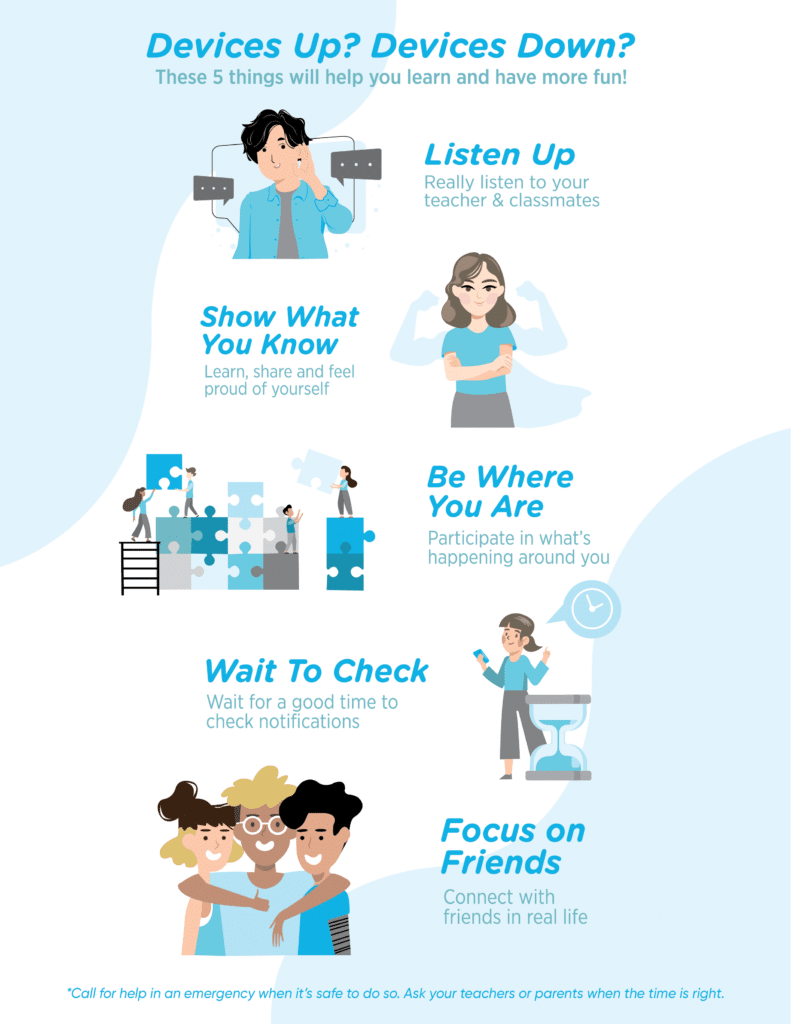Cell phone use in schools is a trending topic today. Should schools ban phones to reduce screen time distractions in class, or should parents be allowed to send text messages to their children during school hours?
Opinions differ, and there is no easy answer.

Cell Phone Use In Schools
There are always two sides to a story, and cell phone use in schools is no different.
Phone ban advocates
Some teachers, administrators, and school boards are increasingly worried about cell phone distractions in class. [1] Some parents echo these sentiments, while others disagree.
Phone use advocates
Cell phones have been advocated for years as a learning tool and for use during emergencies like school shootings.
In 2006, New York City’s Mayor Bloomberg banned cell phones in all public schools. After years of parents demanding the law be overturned, it was lifted in 2015—citing school safety and access to family communication as the reasons.
During school hours, the debate continues as to whether cell phones should be banned in an attempt to get students to pay attention during the day and avoid distractions.

Cell Phone Ownership
Historically, cell phones were only seen in high schools and some middle schools, but now more elementary school students have cell phones as a form of emergency communication.
4 out of 5 parents provide their child a cell phone for safety and peace of mind. [2]
Research shows that between 2015 and 2021, the proportion of 8 to 10 year olds with their own smartphone doubled, with 42% of 10-year-olds having their own cell phone. [3] While phones can provide parents peace of mind, some pediatricians advise against smartphones for children.
If the reason for providing children with a cell phone is safety, then it is advised to give them one with fewer features, just enough to connect in case of an emergency. [1]
Some educators and parents believe the common ground is teaching kids phone etiquette—when phone use is appropriate and when it is not.
Phone Etiquette in Schools
In school, boundaries can be set around the use of phones and social media to teach students how to monitor them. Caregivers can make this task easier by providing resources and support.
Gabb phones have parental controls to turn off features during school hours to help children focus.
Start the conversation
Start by educating students about digital citizenship skills through programs like Be Internet Awesome.
Simple phone etiquette games can help kids learn. The following situations can be role-played or printed out (or make your own!) as a sorting game. In which situations can you have your phone, and when is it best to put it away?
When should I use my phone?
| At dinner when my parents are talking to me? |
| Taking pictures with friends at an after-school event? |
| When my teacher is talking in class? |
| When I need a calculator for math homework? |
| During a test in class? |
| When I need to text a parent for a ride? |
| To report an emergency situation (once you are safe)? |
| To video record a fight at school? |
These situations can be used to discuss respectful phone etiquette with older youth who feel too grown up for games.
Phone Etiquette Educational Poster
Kids can learn how to discern when phones help or distract them in school (and in life). Educators and parents can use this poster as a visual reminder to help them perfect these skills.

Role Models
Stay aware that kids are always watching and learning from adult examples. Remember to teach them proper phone etiquette by exhibiting proper phone usage yourself.
What do you think about phones in schools? Let us know in the comments!
References
- [1] Gilroy, M. (2003). Invasion of the classroom cell phones. Hispanic Outlook in Higher Education, 14, 38–39
- [2] Mayor de Blasio and Chancellor Fariña to Lift School Cell Phone Ban. (2015, January 7). The Official Website of the City of New York. Retrieved October 7, 2022, from https://www1.nyc.gov/office-of-the-mayor/news/013-15/mayor-de-blasio-chancellor-fari-a-lift-school-cell-phone-ban
- [3] Bichu, A. M. (2022, June 29). What Is the Right Age for a Kid to Get a Cellphone? Retrieved October 7, 2022, from https://www.edweek.org/leadership/what-is-the-right-age-for-a-kid-to-get-a-cellphone/2022/06
- [4] Over Four in Five Parents Cite Safety and Peace of Mind as the Top Reasons for Parents Allowing Children to Have Cell Phones. (2010, August 17). https://www.ipsos.com/. Retrieved October 7, 2022, from https://www.ipsos.com/en-us/over-four-five-parents-cite-safety-and-peace-mind-top-reasons-parents-allowing-children-have-cell
- [5] Heather Kelly. (2022, June 1). The Washington Post. Should kids be allowed to use smartphones in the classroom? Retrieved October 10, 2022, from https://www.washingtonpost.com/technology/2022/06/01/phones-school-safety/









Success!
Your comment has been submitted for review! We will notify you when it has been approved and posted!
Thank you!